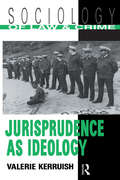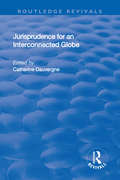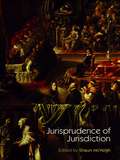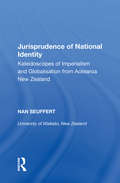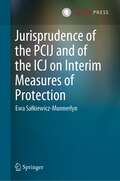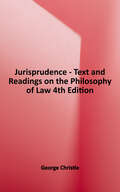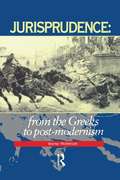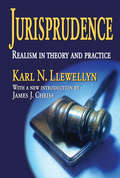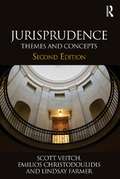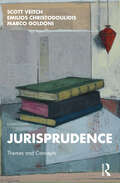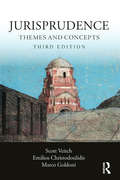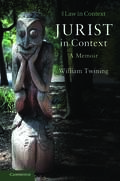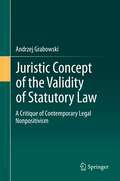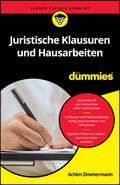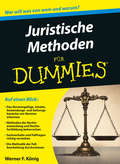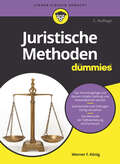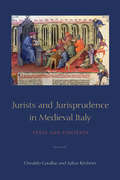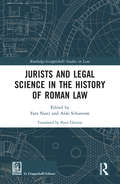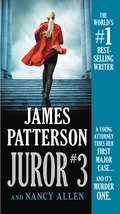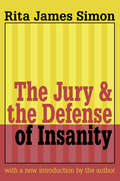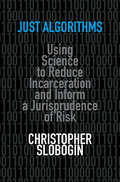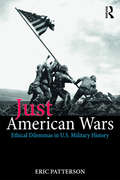- Table View
- List View
Jurisprudence as Ideology (Sociology of Law and Crime)
by Valerie KerruishIn Jurisprudence as Ideology, Valerie Kerruish asks how it is that people who are put down, let down and kept down by law can be thought to have a general political obligation to obey it. She engages with contemporary issues in socialist, feminist and critical legal theory, and links these issues to debates in jurisprudence and the philosophy and sociology of law.
Jurisprudence for an Interconnected Globe (Routledge Revivals)
by Catherine DauvergneThis title was first published in 2003.This book explores the interaction of globalization and the development of law. The framework of the book is established by William Twining, who asks how legal concepts can be generalised within a variety of legal orders. This theme is taken up by a group of leading Australian scholars, who produce essays on international economic law, including financial regulation and human rights, and citizenship, migration and crime, under the headings Globalization and the Laws of Money, Globalization and the Laws of People, Globalization, Cultures and Comparisons. This collection marks an important step towards the construction of a jurisprudence for a connected, but still culturally diverse, globe.
Jurisprudence of Jurisdiction
by Shaun McVeighFor much of the history of the western legal order, jurisdiction has been the first question of law. This book investigates the difference that jurisdiction continues to make to the ordering of normative existence. It also follows the speculation that without an account of jurisdiction, jurisprudence would be left speechless, with no power to address the conditions of attachment to legal and political order. The starting point of this book lies with the claim that a sharper focus can be given to normative legal ordering through questions of jurisdiction than can be through those of moral responsibility or social action. This is so because jurisdiction articulates both the potentiality of law and the conditions of its exercise. It provides the idiom of response to the fact that there is law and to the fact that law institutes, judges and addresses a form of life. From this viewpoint the contributors to this book examine the institution of human rights, the new global and national orders of sovereign power and of trade and information, the judgment and government of death and desire, and the address of colonial and post-colonial legal idioms. In doing this the contributors also provide for the elaboration of questions of jurisdiction as part of the resources and repertoires of jurisprudence. This book provides a point of entry to an emergent genre of writing within doctrinal, historical and critical jurisprudence that has returned to questions of jurisdiction to think again about juridical order and change. In so doing, it also points to questions that must be asked for there to be any interdisciplinary study that addresses law.
Jurisprudence of National Identity: Kaleidoscopes of Imperialism and Globalisation from Aotearoa New Zealand
by Nan SeuffertPresenting a unique blend of historical and contemporary research from a range of interdisciplinary and theoretical analysis, this book examines the intersection of 'race', gender and national identity. Focusing on New Zealand, the book highlights the ways in which shifts in national identity shape and limit legal claims for redress for historical racial injustices internationally. Key features: * Analyzes the identity configurations produced by New Zealand's process of 'settling' colonial injustices and highlights the wider relevance for other groups such as Australian aborigines and Native Americans. * Traces the connections and discontinuities between the free trade imperialism of the mid-19th Century and the Free Trade Globalization of the late 20th Century. * Rich, rigorous interdisciplinarity and use of a range of theoretical perspectives provides insights relevant to legal theorists, feminists and legal scholars internationally.
Jurisprudence of the PCIJ and of the ICJ on Interim Measures of Protection
by Ewa Sałkiewicz-MunnerlynThis book deals with all the cases that came before the Permanent Court of International Justice (PCIJ) from 1922 to 1946, as well as those that were heard by its successor, the International Court of Justice (ICJ) from 1946 to 2020 in which interim measures of protection were either indicated or refused. The monograph shows how cases in which injunctive relief was sought were handled and how the PCIJ and the ICJ have undergone certain reforms over the years. The new approach taken by the author is to present all the matters brought before both the PCIJ and ICJ in full and to present the new requirements on the part of the ICJ that have been formulated in recent years. The book is aimed at law students, lecturers and those working in the field of international law.Ewa Sałkiewicz-Munnerlyn was a Polish diplomat working for the Ministry of Foreign Affairs from 1991 to 2018. She was appointed charge d’affaires at the Polish Embassy to the Holy See from 1993-1994, after which she served as the Polish consul at the Consular Division of the Polish Embassy in Washington D.C. from 1995-1999. She then held the position of Human Rights Officer of the OSCE in Macedonia (Skopje and Ohrid) and Bosnia and Hercegovina (Pale in Republika Srbska) from 2001-2005 and has also several times worked as a short-term observer of the OSCE during parliamentary and presidential elections in Ukraine, Russia, Moldova and Belarus. She attained a Ph.D. at the Jagiellonian University in Krakow, Poland and a post-graduate diploma at the Institut des Hautes Etudes Internationales in Geneva, Switzerland.
Jurisprudence, Text and Readings on the Philosophy of Law (American Casebook Series)
by George G. ChristieThis book is designed for use in courses in law schools and university departments of philosophy. It can serve as a text for basic and advanced courses and seminars. Readings include excerpts of classic works of Aristotle, Aquinas, Locke, Hobbes, Kant, Bentham, and Austin. Also included are excerpts from standard works of twentieth-century philosophers. The book explores current legal discourse with readings on topics such as sociobiology, Islamic law, the legal process school, legal feminism, critical legal studies, intersectionality and gender identity theories, law and economics, and new private law theories. It reprints leading cases on natural rights/human rights and readings from online blogs, op-ed essays, news stories and internet publications, as well as drawing on literary treatment of topics relevant to legal philosophy.
Jurisprudence: From The Greeks To Post-Modernity
by Wayne MorrisonThis challenging book on jurisprudence begins by posing questions in the post-modern context,and then seeks to bridge the gap between our traditions and contemporary situation. It offers a narrative encompassing the birth of western philosophy in the Greeks and moves through medieval Christendom, Hobbes, the defence of the common law with David Hume, the beginnings of utilitarianism in Adam Smith, Bentham and John Stuart Mill, the hope for enlightenment with Kant, Rousseau, Hegel and Marx, onto the more pessimistic warnings of Weber and Nietzsche. It defends the work of Austin against the reductionism of HLA Hart, analyses the period of high modernity in the writings of Kelsen, Hart and Fuller, and compares the different approaches to justice of Rawls and Nozick. The liberal defence of legality in Ronald Dworkin is contrasted with the more disillusioned accounts of the critical legal studies movement and the personalised accounts of prominent feminist writers.
Jurisprudence: Realism in Theory and Practice (The\civilization Of The American Indian Ser. #21)
by Karl LlewellynJurisprudence: Realism in Theory and Practice compiles many of Llewellyn's most important writings. For his time, the thirties through the fifties, Llewellyn offered fresh approaches to the study of law and society. Although these writings might not seem innovative today, because they have become widely applied in the contemporary world, they remain a testament to his. The ideas he advanced many decades ago have now become commonplace among contemporary jurisprudence scholars as well as social scientists studying law and legal issues.Legal realism, the ground of Llewellyn's theory, attempts to contextualize the practice of law. Its proponents argue that a host of extra-legal factors--social, cultural, historical, and psychological, to name a few--are at least as important in determining legal outcomes as are the rules and principles by which the legal system operates. Oliver Wendell Holmes, Jr., book, The Common Law, is regarded as the founder of legal realism. Holmes stated that in order to truly understand the workings of law, one must go beyond technical (or logical) elements entailing rules and procedures. The life of the law is not only that which is embodied in statutes and court decisions guided by procedural law. Law is just as much about experience: about flesh-and-blood human beings doings things together and making decisions.Llewellyn's version of legal realism was heavily influenced by Pound and Holmes. The distinction between ""law in books"" and ""law in action"" is an acknowledgement of the gap that exists between law as embodied in criminal, civil, and administrative code books, and law. A fully formed legal realism insists on studying the behavior of legal practitioners, including their practices, habits, and techniques of action as well as decision-making about others. This classic studyis a foremosthistorical work on legal theory, and is essential for understanding the roots of this influential perspective.
Jurisprudence: Themes and Concepts
by Lindsay Farmer Scott Veitch Emilios ChristodoulidisJurisprudence: Themes and Concepts offers an original introduction to, and critical analysis of, the central themes studied in jurisprudence courses. The book is presented in three parts each of which contains General Themes, Advanced Topics, tutorial questions and guidance on further reading: Law and Politics, locating the place of law within the study of institutions of government Legal Reasoning, examining the contested nature of the application of law Law in Modernity, exploring the social forces that shape legal development. This second edition includes enhanced discussion of the rise of legal positivism within the context of the rise of the modern state, the changing role of natural and human rights discourse, concepts of justice in and beyond the nation state, the impact of emergency doctrines in contemporary legal regulation, and challenges to the rule of law in light of shifting and competing demands for new types of social solidarity. Accessible, interdisciplinary, and socially informed this book has been revised to take into account the latest developments in jurisprudential scholarship.
Jurisprudence: Themes and Concepts
by Scott Veitch Emilios Christodoulidis Marco GoldoniJurisprudence: Themes and Concepts offers an original introduction to, and critical analysis of, the central themes studied in jurisprudence courses. The book is organised in three parts: Part I sets out the key elements of modern law and their relation to political, economic, and social conditions. Part II presents competing accounts of the nature of legal validity, legality, legal reasoning, and justice. Both parts feature corresponding tutorial questions. Part III contains advanced topics including chapters on legal pluralism, law and disciplinary power, and law and the Anthropocene. Every chapter gives guidance on further reading. This fourth edition has been fully revised and updated to take into account the latest developments in jurisprudential scholarship. Additional material is included in the coverage of social law, colonialism and critical race theory, the challenges of digital technology and the emergence of new legal subjects. Accessible, interdisciplinary and socially informed, Jurisprudence: Themes and Concepts is essential reading for all students of jurisprudence and legal philosophy.
Jurisprudence: Themes and Concepts (Critical Studies In Jurisprudence Ser.)
by Scott Veitch Emilios Christodoulidis Marco GoldoniJurisprudence: Themes and Concepts offers an original introduction to, and critical analysis of, the central themes studied in jurisprudence courses. The book is presented in three parts: the first two contain general themes with corresponding tutorial questions, and the third part contains advanced topics. Each chapter gives guidance on further reading. Accessible, interdisciplinary, and socially informed, this book has been revised to take into account the latest developments in jurisprudential scholarship.
Jurist in Context: A Memoir (Law in Context)
by William TwiningThis is the engaging and accessible intellectual memoir of a leading jurist. It tells the story of the development of his thoughts and writings over sixty years in the context of three continents and addresses the complexities of decolonisation, the troubles in Belfast, the contextual turn in legal studies, rethinking evidence and the implications of globalisation which have been central to his life and research. In propounding his original views as an enthusiastic self-styled 'legal nationalist', Twining maps his ideas of law as a unique discipline, which pervades all spheres of social and political life while combining theory and practice, concepts and values, facts and rules in uniquely fascinating ways. Addressed to academic lawyers generally and to other non-specialists, this story brings out the importance and fascinations of a discipline that has changed, expanded and diversified in the post-War years, with an eye to its future development and potential.
Juristic Concept of the Validity of Statutory Law: A Critique of Contemporary Legal Nonpositivism
by Malgorzata Kieltyka Andrzej GrabowskiThis book presents the theory of the validity of legal norms, aimed at the practice of law, in particular the jurisdiction of the constitutional courts. The postpositivist concept of the validity of statutory law, grounded on a critical analysis of the basic theories of legal validity elaborated up to now, is introduced. In the first part of the book a contemporary German nonpositivist conception of law developed by Ralf Dreier and Robert Alexy is analysed in order to answer the question whether the juristic concept of legal validity should include moral standards or criteria. In the second part, a postpositivist concept of legal validity and an innovative model of validity discourse, based on the juristic presumption of the validity of legal norms, are proposed. The book is a work on analytical legal theory, written from a postpositivist, detached point of view.
Juristische Klausuren und Hausarbeiten für Dummies (Für Dummies)
by Achim ZimmermannSouverän in Klausur und Hausarbeit punkten! Sie müssen in Ihrem Jurastudium eine Hausarbeit oder eine Klausur schreiben? Dabei ist nicht nur Fachwissen gefragt. Dieses Buch hilft Ihnen, die juristischen Methoden sicher zu beherrschen, die richtigen Schwerpunkte zu setzen und systematisch zu argumentieren. Lernen Sie, wie Sie gut strukturierte Texte schreiben und die richtigen juristischen Formulierungen anwenden. Achim Zimmermann verrät Ihnen außerdem, welche Fehler zu Punktabzügen führen, welche Formalien Sie bei Hausarbeiten beachten müssen und wie Sie bei Klausuren punkten können. Sie erfahren Was Gutachten- und Urteilsstil unterscheidet Wie Sie ein cleveres Zeitmanagement entlasten kann Wie Sie richtig zitieren Wie Sie mit Microsoft Word Ihrer Hausarbeit eine klare Struktur geben
Juristische Methoden für Dummies
by Werner F. KönigStehen Sie gerade am Anfang eines Jura-Studiums? Oder müssen Sie sich als Nicht-Jurist im Nebenfach mit Jura beschäftigen? Ist Ihnen die juristische Methodik noch fremd und fühlt sie sich für Sie gewöhnungsbedürftig an? Das muss nicht so bleiben! Dieses Buch führt Sie in die Logik der Juristerei ein und erklärt Ihnen in gewohnt verständlicher und anschaulicher Dummies-Manier die Welt der Normengefüge, Sachverhalte und Fallfragen, Auslegung und Fallbearbeitung. Und ganz nebenbei erfahren Sie auch, welche juristischen Todsünden Sie auf keinen Fall begehen sollten.
Juristische Methoden für Dummies (Für Dummies)
by Werner F. KönigStehen Sie gerade am Anfang eines Jura-Studiums? Oder müssen Sie sich als Nicht-Jurist im Nebenfach mit Jura beschäftigen? Ist Ihnen die juristische Methodik noch fremd und fühlt sie sich für Sie gewöhnungsbedürftig an? Das muss nicht so bleiben! Dieses Buch führt Sie in die Logik der Juristerei ein und erklärt Ihnen in gewohnt verständlicher und anschaulicher Dummies-Manier die Welt der Normengefüge, Sachverhalte und Fallfragen, Auslegung und Fallbearbeitung. Und ganz nebenbei erfahren Sie auch, welche juristischen Todsünden Sie auf keinen Fall begehen sollten.
Juristische Personen des öffentlichen Rechts und die Umsatzsteuer: Arbeitshilfen zum § 2b UStG
by Michael HorstDas Buch enthält eine Auswahl an Themen, welche für umsatzsteuerliche Würdigung im Alltag von jPdöR - besonders für die Gebietskörperschaften - von Bedeutung sind. §2b UStG wird aus Sicht einer Gebietskörperschaft dargestellt. Dabei orientiert sich das Buch an einem städtischen Haushalt. Praktische Arbeitshilfen und Beispiele ermöglichen den Transfer auf die individuellen kommunalen Umsätze.
Jurists and Jurisprudence in Medieval Italy: Texts and Contexts (Toronto Studies in Medieval Law)
by Julius Kirshner Osvaldo CavallarJurists and Jurisprudence in Medieval Italy is an original collection of texts exemplifying medieval Italian jurisprudence, known as the ius commune. Translated for the first time into English, many of the texts exist only in early printed editions and manuscripts. Featuring commentaries by leading medieval civil law jurists, notably Azo Portius, Accursius, Albertus Gandinus, Bartolus of Sassoferrato, and Baldus de Ubaldis, this book covers a wide range of topics, including how to teach and study law, the production of legal texts, the ethical norms guiding practitioners, civil and criminal procedures, and family matters. The translations, together with context-setting introductions, highlight fundamental legal concepts and practices and the milieu in which jurists operated. They offer entry points for exploring perennial subjects such as the professionalization of lawyers, the tangled relationship between law and morality, the role of gender in the socio-legal order, and the extent to which the ius commune can be considered an autonomous system of law.
Jurists and Legal Science in the History of Roman Law (Routledge-Giappichelli Studies in Law)
by Fara NastiThis book provides a new approach to the study of the History of Roman Law. It collects the first results of the European Research Council Project, Scriptores iuris Romani - dedicated to a new collection of the texts of Roman jurisprudence, highlighting important methodological issues, together with innovative reconstructions of the profiles of some ancient jurists and works. Jurists were great protagonists of the history of Rome, both as producers and interpreters of law, since the Republican Age and as collaborators of the principes during the Empire. Nevertheless, their role has been underestimated by modern historians and legal experts for reasons connected to the developments of Modern Law in England and in Continental Europe. This book aims to address this imbalance. It presents an advanced paradigm in considering the most important aspects of Roman law: the Justinian Digesta, and other juridical late antique anthologies. The work offers an historiographic model which overturns current perspectives and makes way for a different path for legal and historical studies. Unlike existing literature, the focus is not on the Justinian Codification, but on the individualities of ancient Roman Jurists. As such, it presents the actual legal thought of its experts and authors: the ancient iuris prudentes. The book will be of interest to researchers and academics in Classics, Ancient History, History of Law, and contemporary legal studies.
Juror #3
by James Patterson Nancy AllenA young attorney tries her first case . . . and it's Murder One in a legal thriller from the world's #1 bestselling writer. <P><P>Ruby Bozarth, a newcomer to Rosedale, Mississippi, is also fresh to the Mississippi Bar--and to the docket of Circuit Judge Baylor, who taps Ruby as defense counsel in a racially charged felony. <P><P> The murder of a woman from one of the town's oldest families has Rosedale's upper crust howling for blood, and the prosecutor is counting on Ruby's inexperience to help him deliver a swift conviction. Ruby's client is a college football star who has returned home after a career-ending injury, and she is determined to build a defense that will stick. She finds help in unexpected quarters from Suzanne, a hard-charging attorney armed to the teeth, and Shorty, a diner cook who knows more than he lets on. <P><P> Ruby never belonged to the country-club set, but once she nearly married into it. As news breaks of a second murder, Ruby's ex-fiancé, Lee Greene, shows up on her doorstep--a Southern gentleman in need of a savior. As lurid, intertwining investigations unfold, no one in Rosedale can be trusted, especially the twelve men and women impaneled on the jury. They may be hiding the most incendiary secret of all. <P><b>A New York Times Bestseller</b>
Jury and the Defense of Insanity
by Rita J. SimonThirty years after it was first published, the issues raised in The Jury and the Defense of Insanity remain pertinent. Rita James Simon examines how motivated and competent juries are, how well jurors understand and follow judges' instructions, their understand-ing of expert testimony, and the extent to which their own backgrounds and experiences influence their decisions. Simon provides a rare opportunity to observe how jurors go about the process of deliberating and reaching a verdict by following them into the jury room and recording their deliberations. This pathbreaking study of jury room behavior provides compelling evidence of the effectiveness of our trial by jury system.The Jury and the Defense of Insanity was the product of an experimental study con-ducted as part of the University of Chicago Jury Project. Over 1,000 jurors were chosen to participate, not as volunteers, but as part of their regular jury duty, in two experimental trials, one on a charge of housebreaking, the other of incest. In each the insanity de-fense was raised. Court judges instructed the jurors to consider the recorded trials they were about to hear with all the care and seriousness they would give to a real criminal prosecution, and the taped recordings of their deliberations make it clear that they did just that. These recordings, along with responses to detailed questionnaires, yielded significant data, equally applicable to civil as to criminal cases. We learn their reactions to their fellow jurors; personal evaluations of the quality and effectiveness of delibera-tions; the degree to which religion, sex, social status, education, and like factors affect participation in and influence on the course of the deliberation; and the recounting of and reliance upon personal experience in seeking to reach a verdict, among other in-sights furnished by this study.This is an exact record not a description or recollected account of the struggle of a jury to weigh evidence and achieve a just verdict. For lawyers whose job it is to win civil and criminal cases, for behavioral scientists who study male and female reactions in their cultural environment to the circumstances that confront them, and to all who are interested in how people behave and why, in a dramatic, socially significant situation, this is a fascinating and revealing book.
Jus Cogens
by Thomas WeatherallOne of the most complex doctrines in contemporary international law, jus cogens is the immediate product of the socialization of the international community following the Second World War. However, the doctrine resonates in a centuries-old legal tradition which constrains the dynamics of voluntarism that characterize conventional international law. To reconcile this modern iteration of individual-oriented public order norms with the traditionally State-based form of international law, Thomas Weatherall applies the idea of a social contract to structure the analysis of jus cogens into four areas: authority, sources, content and enforcement. The legal and political implications of this analysis give form to jus cogens as the product of interrelation across an individual-oriented normative framework, a State-based legal order, and values common to the international community as a whole.
Jus Post Bellum and Transitional Justice
by Larry May Elizabeth EdenbergThis collection of essays brings together jus post bellum and transitional justice theorists to explore the legal and moral questions that arise at the end of war and in the transition to less oppressive regimes. Transitional justice and jus post bellum share in common many concepts that will be explored in this volume. In both transitional justice and jus post bellum, retribution is crucial. In some contexts criminal trials will need to be held, and in others truth commissions and other hybrid trials will be considered more appropriate means for securing some form of retribution. But there is a difference between how jus post bellum is conceptualized, where the key is securing peace, and transitional justice, where the key is often greater democratization. This collection of essays highlights both the overlap and the differences between these emerging bodies of scholarship and incipient law.
Just Algorithms: Using Science to Reduce Incarceration and Inform a Jurisprudence of Risk
by Christopher SloboginStatistically-derived algorithms, adopted by many jurisdictions in an effort to identify the risk of reoffending posed by criminal defendants, have been lambasted as racist, de-humanizing, and antithetical to the foundational tenets of criminal justice. Just Algorithms argues that these attacks are misguided and that, properly regulated, risk assessment tools can be a crucial means of safely and humanely dismantling our massive jail and prison complex. The book explains how risk algorithms work, the types of legal questions they should answer, and the criteria for judging whether they do so in a way that minimizes bias and respects human dignity. It also shows how risk assessment instruments can provide leverage for curtailing draconian prison sentences and the plea-bargaining system that produces them. The ultimate goal of Christopher Slobogin's insightful analysis is to develop the principles that should govern, in both the pretrial and sentencing settings, the criminal justice system's consideration of risk.
Just American Wars: Ethical Dilemmas in U.S. Military History (War, Conflict and Ethics)
by Eric PattersonThis book examines the moral choices faced by U.S. political and military leaders in deciding when and how to employ force, from the American Revolution to the present day. Specifically, the book looks at discrete ethical dilemmas in various American conflicts from a just war perspective. For example, was the casus belli of the American Revolution just, and more specifically, was the Continental Congress a "legitimate" political authority? Was it just for Truman to drop the atomic bomb on Japan? How much of a role did the egos of Kennedy, Johnson and Nixon play in prolonging the Vietnam War? Often there are trade-offs that civilian and military leaders must take into account, such as General Scott’s 1847 decision to bombard the city of Veracruz in order to quickly move his troops off the malarial Mexican coast. The book also considers the moral significance and policy practicalities of different motives and courses of action. The case studies provided highlight the nuances and even limits of just war principles, such as just cause, right intention, legitimate authority, last resort, likelihood of success, discrimination, and proportionality, and principles for ending war such as order, justice, and conciliation. This book will be of interest for students of just war theory, ethics, philosophy, American history and military history more generally.
